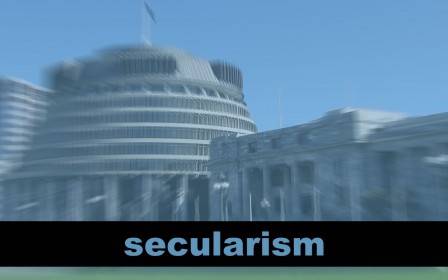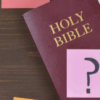
In 2011 I spoke at the national interfaith forum on State and Church. Four years on, these comments seem even more relevant today than they were back then.
Part 1 is a response to a paper presented by Professor Paul Morris from Victoria University. (It should be clear what points are being rebutted).
Part 2 is a response to the 5 key questions being addressed at the forum:
- Should the state observe religious rituals?
- Should parliament open with a Christian prayer, other prayer, or any prayer at all?
- Should public events acknowledge the diversity of religion and belief?
- Should the state recognise and support religious activities?
- Should the state promote interfaith dialogue?
But for those who just want the ‘bottom line’, let me open with my conclusion:
I do not say there should be Christian prayer in parliament because
- Christianity is the largest religious group, even though this is true
- And not because it’s unfair that secularists have already squeezed Christianity out of 99.9% of the public square
- Not because of tradition, although tradition is important and should not be changed lightly
- Nor because of our history, although Christianity has played an important role and it’s reasonable that it should be reflected
- Nor because of its symbolism, although this is not insignificant
- And certainly not because the church needs it. The church has seen many political leaders and regimes come and go over 2,000 years
I say there should be Christian prayer because it’s right that parliament should begin its work each day by acknowledging the sovereignty of God
Part 1
I want to thank Professor Paul Morris for the work which went into preparing his paper. The survey of nation states and their religions, and the summary of history and trends in this issue, are useful in themselves. And I am sure the paper overall will achieve well its purpose of provoking debate and discussion.
Before I share some thoughts of my own on state and church, I would just like to touch briefly on a few points in Paul’s paper:
- It’s good to have you record that there are no exclusively secular states, because there are many in New Zealand who try to maintain that New Zealand is totally secular as a basis for various other arguments.
- You make the point that in the various ways that states interact with religions “it is the majority faith that benefits from these arrangements”. I think the picture is actually more complex than that.The fact that in NZ three statutory holidays are based on the Christian calendar, or that a state funeral is held in a Christian cathedral, is probably not as significant as the fact that minority religions are free to practise their beliefs including building places of worship.
This is sadly not true in some regimes around the world. As this discussion progresses, it would be useful to have some research into what combination of state and religion offers the greatest level of protection and freedom for minorities. - The three new political models you outline are very useful. Church leaders are continually looking at how churches can engage more effectively and positively in their communities and this section will help in those discussions.With possibly a very small number of exceptions, no church leader wants to see a return to a Christendom model where the church ruled the state. At the same time, few if any church leaders probably think that a state ruled by secularists will be ultimately beneficial for society.As you say in your closing “the failure of liberalism to sustain values is a growing concern”. What we need is a discussion about what sort of model will be in NZ’s best interests long-term, and that’s what today is all about.
- Your fourth factor regarding the growing concern with social cohesion is especially pertinent, and possibly the real starting point for this whole discussion.Numerous incidents including the London riots, the global financial crisis, the News Corp phone hacking, the growing gaps between rich and poor, and the inability of western governments to balance their budgets, highlight this problem.
- When you move to New Zealand the description of Christianity as a “minority religion” because it might fall below 50% will certainly raise a few eyebrows. People think of Christianity in Turkey as a minority religion, or Buddhism in New Zealand. But to describe the largest religious group in a country as a “minority religion” is unusual to say the least.
- You point out that the church’s influence has been declining since the 1950s which is true. It’s also true that NZ has seen a corresponding and dramatic increase in many negative social indicators over that same time period. Although direct causation is hard to prove, this is something that people should seriously reflect on.
- Singling out churches for failing to honour the Treaty is a bit harsh. While their record is not perfect, the fact is that church leaders spoke out often against the government and others for treaty abuses for nearly 20 years after the treaty – as they continue to do today. And to a large extent it was the work of Christian missionaries, and the high regard in which they were held by Maori that almost certainly led to the Treaty even being signed.
- What I appreciate most about this paper is that it is descriptive of what is happening, which leaves the discussion wide open as to what should happen.
Part 2
The brochure for this forum asked 5 questions:
- Should the state observe religious rituals?
- Should parliament open with a Christian prayer, other prayer, or any prayer at all?
- Should public events acknowledge the diversity of religion and belief?
- Should the state recognise and support religious activities?
- Should the state promote interfaith dialogue?
I don’t have time to address all of these questions in detail, so let me say my answer to all questions is ‘yes’, and on question 2, I believe parliament should open specifically with Christian prayer.
“It was the Christian foundation of social and cultural life in Europe that made possible the emergence first of capitalism, then of democratic politics.”
This is not something I said. It is a quotation in a book called Civilisation by historian Nial Ferguson, from a member of the Chinese Academy of Sciences, who was part of a team tasked with discovering why it was that Europe having lagged behind China until the 17th century, overtook it, rising to prominence & dominance.
“At first, [the scientist] said, we thought it was your guns. You had better weapons. Then we delved deeper and thought it was your political system. Then we searched deeper still, and concluded that it was your economic system. But for the past 20 years we have realised that it was in fact your religion, Christianity. It was the Christian foundation of social and cultural life in Europe that made possible the emergence first of capitalism, then of democratic politics.
What is even more interesting is that this story was told in an article by Lord Jonathan Sachs, Chief Rabbi to the Commonwealth in The Times 12 May 2011.
Sachs went on to say “While Christianity is in decline in Britain and most of Europe it is growing and thriving in China where the number of people in church on Sunday is greater than the total membership of the Communist Party – and this in the land that in 1958 Chairman Mao had declared ‘religion-free’.
“As a non-Christian” he says,” I find this fascinating. Europe is losing the very thing that once made it great, while China the world’s fastest-growing economy, is discovering it. China – the home of Confucianism, Taoism and its own brand of communism. That is something no one could have foreseen.
What has China realised that the West is rapidly forgetting? That a civilisation is as strong as its faith … Societies start growing old when they lose faith in the transcendent. They then lose faith in an objective moral order and end by losing faith in themselves”.
Sounds vaguely like a description of Western liberal democracies.
//
God created the Church and God created government. Each has a different function. Each is accountable to God. Apart from anything else, opening parliament each day with prayer is a reminder that politicians do not have ultimate power.
Governments which make no reference to God fall into two errors: they miss out on the provision and guidance which come from God, and they begin to think and act as if they were God. A former NZ Prime Minister is on record saying that government can do anything it wants to.
But this is not true. States are not the final arbiter of right and wrong. As one example, we expect governments everywhere to uphold human rights. These rights transcend governments. In fact it’s easy to show they even transcend the United Nations. Where do they come from?
Christians say they are visible in many belief systems but they are most clearly displayed in the person of Jesus Christ.
Cardinal George Pell in the 2009 Sir John Graham lecture said “Concern for the weak and unfortunate was considered foolishness in the Roman world. It was Christianity which made it a virtue. While freedom was greatly extolled in the ancient world, it was only for the aristocratic and powerful few and was explicitly linked to domination of the many, including the many slaves; sometimes 40% of the population. It was Christianity which eventually set the slaves free, which taught that freedom is not just a privilege of the strong …”
//
I do not say there should be Christian prayer in parliament because
- Christianity is the largest religious group, even though this is true
- And not because it’s unfair that secularists have already squeezed Christianity out of 99.9% of the public square
- Not because of tradition, although tradition is important and should not be changed lightly
- Nor because of our history, although Christianity has played an important role and it’s reasonable that it should be reflected
- Nor because of its symbolism, although this is not insignificant
- And certainly not because the church needs it. The church has seen many political leaders and regimes come and go over 2,000 years
- I say there should be Christian prayer because it’s right that parliament should begin its work each day by acknowledging the sovereignty of God









0 Comments